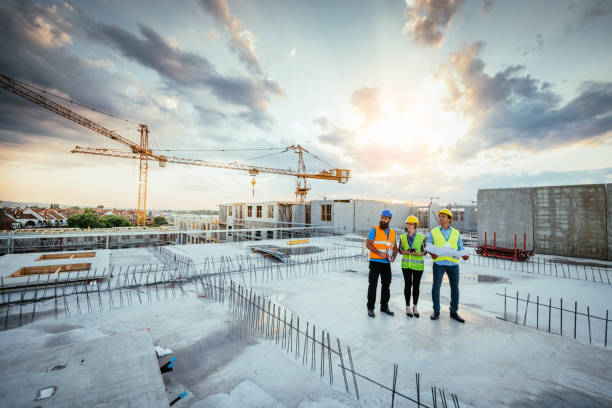Building a Career with Construction Companies in Australia
Australia's construction industry offers diverse career opportunities for professionals seeking stable employment in a dynamic field. From residential buildings to large-scale infrastructure projects, construction companies provide pathways for both skilled tradespeople and those in administrative or management roles. Understanding the industry landscape, typical responsibilities, and employer expectations can help individuals make informed decisions about pursuing construction careers in the Australian market.

Typical Duties in Construction
Construction work encompasses a broad range of responsibilities that vary based on specialization and seniority. Entry-level laborers often handle material transportation, site cleaning, and assisting skilled tradespeople. As workers gain experience, they may take on more specialized duties such as carpentry, bricklaying, electrical work, or plumbing. Site supervisors coordinate daily operations, ensuring projects adhere to schedules, quality standards, and safety protocols. Project managers oversee entire construction projects, managing budgets, timelines, and client relationships. Administrative staff handle documentation, procurement, and compliance requirements, while specialized roles like estimators, surveyors, and engineers provide technical expertise throughout the construction process.
Why the Industry Continues to Need Workers in Australia
Australia’s construction sector demonstrates ongoing workforce requirements due to several factors. The country’s growing population drives demand for new housing and supporting infrastructure. Government investments in public infrastructure projects, including transportation networks, utilities, and community facilities, create sustained employment opportunities. Additionally, Australia’s commitment to renewable energy has sparked construction of solar farms, wind turbines, and other green infrastructure. Building maintenance and renovation work provides steady employment even during periods of reduced new construction. The industry also faces challenges with an aging workforce, creating opportunities for new entrants as experienced workers retire. This combination of factors contributes to the sector’s consistent need for qualified construction professionals.
What Employers Expect from Workers
Australian construction employers prioritize specific qualities when evaluating potential employees. Safety consciousness ranks as perhaps the most critical attribute, as construction sites present numerous hazards. Candidates must demonstrate understanding of and commitment to workplace safety protocols. Technical competence appropriate to the role is essential, whether that involves trade skills, administrative capabilities, or management expertise. Reliability, punctuality, and consistent attendance are fundamental expectations in an industry where project timelines and team coordination are crucial. Employers value strong communication skills that enable effective collaboration with diverse stakeholders. Physical fitness requirements vary by position, with many roles demanding stamina and strength for manual tasks. Adaptability proves particularly important in construction, as workers must adjust to changing weather conditions, project modifications, and evolving technologies.
Qualifications and Training Pathways
Entering Australia’s construction industry typically requires specific credentials depending on the intended role. Trade positions generally demand completion of an apprenticeship, combining on-the-job training with formal education through registered training organizations. These programs usually span 3-4 years, culminating in nationally recognized qualifications. Technical positions often require relevant diplomas or university degrees in fields such as construction management, engineering, or architecture. Beyond formal education, most construction roles necessitate specific certifications and licenses. The White Card (General Construction Induction Card) serves as the minimum requirement for anyone working on construction sites. Specialized trades require additional licensing through state-specific regulatory bodies, ensuring practitioners meet established competency standards.
Career Progression Opportunities
The construction industry offers defined advancement pathways for motivated professionals. Entry-level workers can progress to specialized trade positions through additional training and certification. Experienced tradespeople often advance to supervisory roles, overseeing teams and coordinating work across multiple areas. Further career development may lead to project management positions, where individuals assume responsibility for entire construction projects. Some professionals transition to specialized roles in estimating, safety management, or quality assurance. Business-minded individuals might establish their own contracting companies or consultancies after gaining sufficient experience. The industry also provides opportunities to move between residential, commercial, and infrastructure sectors, each offering unique challenges and learning experiences.
Salary Expectations in Australian Construction
Construction salaries in Australia vary considerably based on role, experience, location, and industry segment. Entry-level laborers typically earn between $45,000 and $60,000 annually. Qualified tradespeople with several years of experience can expect $60,000 to $85,000 per year. Site supervisors and foremen generally command salaries ranging from $85,000 to $110,000. Project managers earn between $110,000 and $150,000 annually, with senior roles potentially exceeding $200,000. Specialized professionals like quantity surveyors typically receive $80,000 to $120,000. Regional variations exist, with roles in metropolitan areas or remote mining regions often offering premium compensation compared to regional centers.
Prices, rates, or cost estimates mentioned in this article are based on the latest available information but may change over time. Independent research is advised before making financial decisions.
Construction Industry Challenges and Rewards
Working in construction presents distinct challenges alongside meaningful rewards. The industry involves physical demands and exposure to weather conditions that can be taxing. Construction schedules sometimes require long hours or weekend work to meet deadlines. However, these challenges are balanced by significant advantages. Many construction professionals express satisfaction in creating tangible structures that contribute to communities. The industry offers above-average compensation for skilled workers, particularly in specialized trades facing labor shortages. Construction also provides genuine career mobility, with skills that remain relevant across different regions and sectors. For many, the varied nature of construction work, with constantly changing projects and environments, offers stimulating variety compared to office-based careers.




